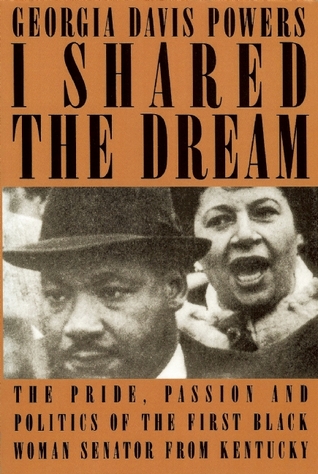“She was ‘The Woman’ the press whispered about, with Dr. Martin Luther King on that last tragic trip to Memphis,” reads the back-cover blurb in oversize type. No, not Irene Adler, but the “first black woman senator from Kentucky.” Georgia Powers has finally come forward and described her many trysts with King, recounting how she tried to climb into the ambulance with the dying King but was told by Andy Young, “No, Senator, I don’t think you want to do that.” Unfortunately, this should also have been the publisher’s response to Powers’ attempt at autobiography, for do we really need to know about her first menstruation, the size of her “full chest,” how she cheated on her first husband, cheated on her second husband, and once broke into the house of a couple she cleaned for as a teen in order to use their bedroom to make love to her boyfriend? True, Powers was ahead of her time. When the homeowner discovered that he had Lolita instead of Hazel for a housecleaner. Powers threatened to accuse him of sexual advances if he ever complained to her parents. And Powers does occasionally unearth a gem, as when she remembers a particular phone conversation between King and his legal advisor Stanley Levison. Upon hanging up the phone. King was overhead muttering, “Cowardice asks, is it safe? Expediency asks, is it political? Vanity asks, is it popular? But Conscience asks, is it right?” “Will you use that in our speeches?” asks Powers. “He smiled, ‘I will use it when it is appropriate.’ I said, ‘M.L., is anything we do and say original?’ He replied, ‘Originality comes only from God.'” But the preponderance of this book is rank self-promotion that ironically tarnishes every individual and cause that Powers has always championed. For does learning details of King’s adulteries improve our image of the man? Will highlighting these “family values” of the original civil rights leaders help alleviate the plague of promiscuity ravaging the black family today? Powers has long been honored as a pioneering black feminist whose political accomplishments won greater respect for women of all races, but is stealing another woman’s man, and doing so repeatedly, an act of “respect,” of “female solidarity”? Is this what “empowerment” really means? “After that first night [with King],” she writes, “I knew there was no going back. How could I not seize the moment . . . no matter what the obstacles. . . . I have never regretted being there with him.” Conscience does indeed ask, “Is it right?” And King and Georgia Powers replied, “Who cares?”
[I Shared the Dream: The Pride, Passion and Politics of the First Black Woman Senator From Kentucky, by Georgia Davis Powers (Far Hills, NJ: New Horizon Press), 321 pp., $25.95]

Leave a Reply